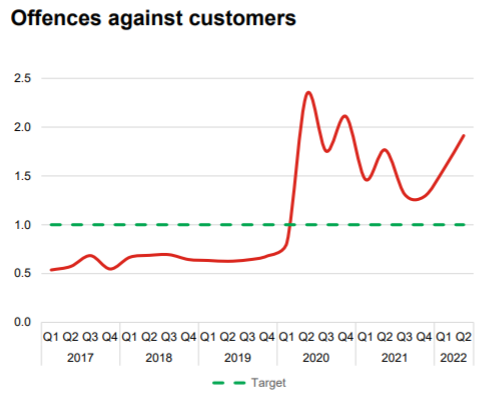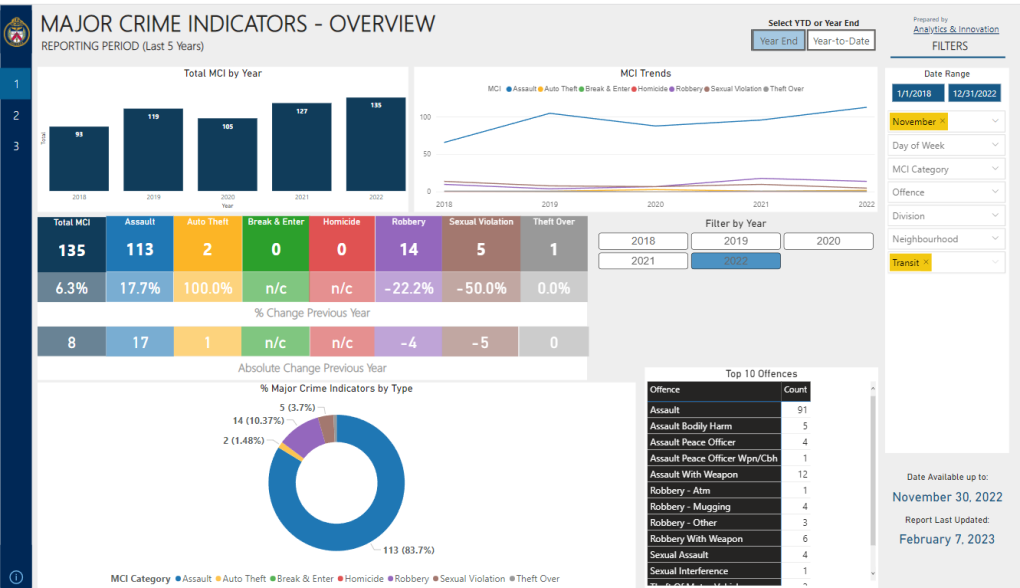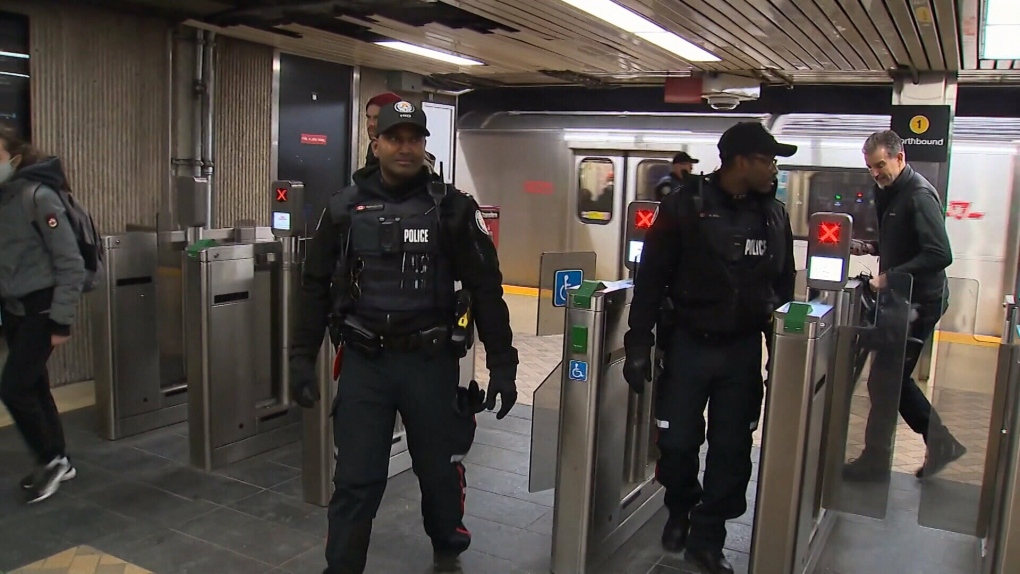'What is safety?': Transit users call for action at town hall following rash of TTC violence
Taking the stage at a Thursday night town hall meeting to discuss safety on the Toronto Transit Commission (TTC), outreach worker Lorraine Lam introduced herself as a “big fan of Toronto transit.”
“I am here as a transit rider,” she said at the event organized by transit advocacy group TTCRiders. Lam’s approach to safety, she explained, can be framed as four questions:
“Whose safety are we talking about? What is safety? Who's the public that we're talking about? And where do people go?” she asked.
In recent months, Toronto’s transit system has been at the centre of a string of violent – and, at times, seemingly random – crime, prompting increased enforcement and police presence, and leaving some riders questioning their personal safety.
The concerns aren’t unfounded – in the last month, the Toronto Police Service (TPS) notified the public of at least 14 different violent crimes against riders or employees of the system. In the weeks before that, a string of muggings, assaults and a fatal stabbing at a west end station, prompted calls for national action.
Thursday’s town hall, attended by approximately 200 people in-person and on Zoom, included speakers from the Gerstein Crisis Centre, Jane Finch Action Against Poverty, and the Chinese Canadian National Council of Toronto, among others. Representatives for the TTC were not present, and a spokesperson for the agency said it wasn’t approached to be involved.
 A town hall to address safety on the TTC amid a string of recent violent incidents is held in Toronto on Feb. 09, 2023.
A town hall to address safety on the TTC amid a string of recent violent incidents is held in Toronto on Feb. 09, 2023.
The event provided a platform for a variety of perspectives regarding safety on the publicly-funded transit system before a final version of the 2023 municipal operating budget is passed next week. Speakers and participants alike agreed that solutions were direly needed, with some offering differing approaches to those the city has tried in the past.
IS CRIME INCREASING?
According to the TTC’s CEO reports, the number of incidents against employees remains lower than a 2020 peak, but has started to trend upwards again in 2022.
 A graph from the TTC's latest CEO report. (Toronto Transit Commission)
A graph from the TTC's latest CEO report. (Toronto Transit Commission)
The data suggests that incidents against customers steadily increased throughout 2022 – in the beginning of the year, the number of monthly incidents hovered around 60. In November 2022, there were 303 incidents against customers. Meanwhile, the number of incidents against employees in 2022 rose for the first six months, then began to fluctuate.
In November, the most recent period reflected in TTC’s data, there were a total of 135 incidents called into the TPS on transit. Of those incidents, 113 were assaults, 14 were robberies, and 5 were sexual violations.
 Toronto police's Major Crimes Index for Nov. 2022, for transit-related incidents. (Toronto Police Service)
Toronto police's Major Crimes Index for Nov. 2022, for transit-related incidents. (Toronto Police Service)
There is currently no publicly available data past November 2022.
“Without TTC data publicly available from December and January, it is not yet clear if there has indeed been a significant increase in the last few months,” panel moderator Alok Mukherjee said Thursday evening, noting that the number of recorded offenses against TTC users has decreased since October 2020.
“We all deserve serious evidence-based solutions that will create a safer city and TTC for everyone in the long term, but Mayor John Tory has not provided any evidence that his decision to expand police [...] on the TTC will prevent violence,” he said.
While there is not one dataset or indicator to reliably point to for clarity on the level of crime in Toronto and transit system safety, the tragic – sometimes random – incidents remain at the forefront of the public consciousness.
Over 70 per cent of Ontarians feel less, or somewhat less, safe when using public transit than they did a year ago, according to a recent Nanos survey. And, about 66 percent of Ontarian respondents said they were more, or somewhat more, cautious of their surroundings when they’re out in an urban setting as a result of recent incidents.
“They're very shocking incidents, and those tend to garner a lot of attention because they involve people who seemingly did not know the offender [...] which makes people feel very vulnerable,” Toronto Metropolitan University associate professor of sociology Heather Rollwagen told CTV News Toronto.
Both Rollwagen and Beverly Bain, professor of gender studies at the University of Toronto and organizer of the No Pride in Policing Coalition expressed skepticism about making judgements on crime rates using the data currently available to the public.
“I’m generally pretty skeptical about using crime rates as an indicator of the actual level of crime or safety because crime rates are just one picture of what's going on, but of course, there could be a lot of unreported crime that we don't know about,” Rollwagen said.
“These statistics are not objective,” Bain said “Yes, we are hearing of particular kinds of attacks taking place [...] but if we have governments that are not taking care of people who are poor, people with mental health issues, people who have nowhere to go or to stay or to be cared for – these are some of the things that will happen.”
WHAT INVESTMENTS ARE ON TRACK FOR THE TTC?
In the wake of recent incidents, the TTC said it remains committed to working with police, the City of Toronto and union partners on employee and customer safety.
It has increased the presence of both its special constables and uniformed employees patrolling the system in recent weeks. TTC CEO Rick Leary and Toronto Mayor John Tory have been sitting down with TPS chief Myron Demkiw and TTC union leaders since December, to discuss safety and security on the system.
“The TTC moves hundreds of millions of customers every year without incident, but we cannot and do not take that for granted,” spokesperson Stuart Green said in a statement issued to CTV News Toronto.
In late January, TPS announced they would deploy 80 officers on the transit network daily – a move Ontario Premier Doug Ford called a ‘band-aid solution.’ The announcement came at the tail end of a week that saw a woman stabbed by a stranger on a streetcar, two transit workers chased through a subway station by a suspect armed with a syringe, and a 16-year-old boy slashed on a bus.
 Toronto police officers patrol the TTC amid a string of recent violent incidents on the transit system.
Toronto police officers patrol the TTC amid a string of recent violent incidents on the transit system.
Four days later, on Jan. 30, the city announced it would hire and deploy 50 additional security guards and community safety ambassadors on the system – a decision the union representing the TTC’s special constables said it would file a grievance over, calling it “highly disappointing.” Green told CTV News Toronto Tuesday they would likely be deployed next week.
While the commission has taken a number of steps towards increasing public safety and enforcement visibility, it also points to larger problems at play within the city.
“We [...] know that there are bigger societal and systemic issues at play when it comes to the root causes of these incidents, and we look forward to a broader discussion about what can be done to reduce all crime,” Green said.
When asked during a January news conference, Leary said the TTC doesn’t know what exactly is behind the recent increase in violence on the network. But, he echoed that the root causes are “complex,” and require a coordinated approach to address.
“We know the TTC really is a microcosm of what's happening across the city right now. And we recognize that there is a bigger society and systemic issue at play here,” Leary said.
“The issue requires longer-term solutions and the TTC will be at the table with these experts [to address] crime prevention, mental health and addiction, and homelessness,” he said.
In the city’s proposed 2023 operating budget, the TTC promised a $53-million subsidy increase, intended, in part, to increase safety and customer experience on the system. While promising to boost enforcement present on the system and elevate customer experience – among other initiatives – the budget also proposes a 10-cent fare increase, reduced service leading to potentially longer wait times, and increased vehicle capacities.
“If this is about mental health, why are we putting money into policing and not actual mental health supports?” Lam asked Thursday evening. “Whose safety are we talking about here? And which public gets to take up space?”
“I think we need to actually stop scapegoating poor and unhoused people for causes of violence on transit,” she said, noting that unhoused populations are more likely to be victims of violent crime than commit it.
Instead of enforcement, Lam urged the city to invest in accessible warming and shelter spaces, overdose responses, and de-escalation tactics, among other community support.
Bain also disavows increased funding of enforcement, and the 10-cent fare increase.
“We didn’t ask for policing and security personnel,” Bain said. “So, what happens now? People have to pay more to ride the TTC?
“What happens to poor people and seniors who are already paying, already having a hard time accessing the TTC? Now they have to pay more? How is this caring for people?”
Instead of increasing policing of the transit network, Bain says the city should invest its resources towards sustainable socio-economic systems.
“It is immediately defunding the police, diverting those funds from the police into [a] sustainable economic and social infrastructure, and supports to people who are poor, who have mental health issues, people who are unemployed, underemployed, people who are homeless – that’s what the [City] should be doing,” Bain said. “So we can create more affordable housing, [and] we can provide people with more sustainability in our city.”
Toronto city council is expected to pass a final version of its 2023 municipal budget on Feb.15, which was pushed back a day due to the late Hazel McCallion’s state funeral being held on Feb.14.
If you feel unsafe on the TTC, two-way communications systems to the transit control centre can be found at Designated Waiting Areas (DWAs), and each station is equipped with emergency alarms.
The TTC notes that those riding the bus alone between 9 p.m. and 5 a.m. can use its Request Stop program, allowing riders to request to be dropped off between regular stops if they are feeling vulnerable. The SafeTTC app can also be used to report suspicious incidents in real time.
With files from CTV News Toronto’s Katherine Declerq and Phil Tsekouras
CTVNews.ca Top Stories

Fall sitting bookended by Liberal byelection losses ends with Trudeau government in tumult
The House of Commons adjourned on Tuesday, bringing an end to an unstable fall sitting that has been bookended by Liberal byelection losses. The conclusion of the fall sitting comes as Prime Minister Justin Trudeau's minority government is in turmoil.
2 B.C. police officers charged with sexual assault
Two officers with a Vancouver Island police department have been charged with the sexual assault of a "vulnerable" woman, authorities announced Tuesday.
Canadian government announces new border security plan amid Donald Trump tariff threats
The federal government has laid out a five-pillared approach to boosting border security, though it doesn't include specifics about where and how the $1.3-billion funding package earmarked in the fall economic statement will be allocated.
B.C. teacher disciplined for refusing to let student use bathroom
A teacher who refused to let a student use the bathroom in a B.C. school has been disciplined by the province's professional regulator.
Most Canadians have heard about Freeland's resignation from Trudeau cabinet, new poll finds
The majority of Canadians heard about Chrystia Freeland's surprise resignation from Prime Minister Justin Trudeau's cabinet, according to a new poll from Abacus Data released Tuesday.
Police chief says motive for Wisconsin school shooting was a 'combination of factors'
Investigators on Tuesday are focused on trying to determine a motive in a Wisconsin school shooting that left a teacher and a student dead and two other children in critical condition.
After investigating Jan. 6, House GOP sides with Trump and goes after Liz Cheney
Wrapping up their own investigation on the Jan. 6 2021 Capitol attack, House Republicans have concluded it's former GOP Rep. Liz Cheney who should be prosecuted for probing what happened when then-President Donald Trump sent his mob of supporters as Congress was certifying the 2020 election.
Wine may be good for the heart, new study says, but experts aren’t convinced
Drinking a small amount of wine each day may protect the heart, according to a new study of Spanish people following the plant-based Mediterranean diet, which typically includes drinking a small glass of wine with dinner.
The Canada Post strike is over, but it will take time to get back to normal, says spokesperson
Canada Post workers are back on the job after a gruelling four-week strike that halted deliveries across the country, but it could take time before operations are back to normal.


































